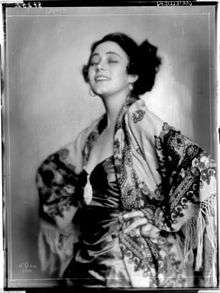Carmen Cartellieri
Carmen Cartellieri (28 June 1891 – 17 October 1953) was an Austrian actress-producer.

Early Life
Carmen Cartellieri was born on 28 June 1891, as Franziska Ottilia Cartellieri. She was born in Proßnitz, Austria-Hungary (now Prostějov, Czech Republic), but spent most of her childhood in Innsbruck, Austria.[1] Her father was an engineer. When she was 16, she married Emanuel Ziffer Edler von Teschenbruck, now known as Mano Ziffer-Teschenbruk[2]. Teschenbruck was an aristocrat who was originally an artist who later became a director.[1]
Career
Cartellieri's early career was developed with help from her husband, Teschenbruck, and Cornelius Hintner, a Tyrolean director in Hungary who used to be a cameraman for Pathé. Cartellieri featured in various Hungarian silent films during 1918-1919. Her stage name was Carmen Teschen.[1] She acted in her first Austrian film, Die Liebe vom Zigeunerstamme/The Gypsy Girl (1919), directed by Hinter.[3] Supposedly, she cowrote the film. She also starred in Hinter's film, Die Würghand/The Strangling Hand (1920), in 1920.[2] Political situations after the war in Hungary forced her to move from Budapest to Vienna. Carmen was able to become a big star, acting in German-language films during the 1920s.[1]
In 1920, Carmen founded the Cartellieri-Film company with Teschenbruck and Hinter. She also used her surname to suggest she was from Italy. The first production of her company was a comedy directed by Teschenbruck called Carmen lernt Skifahren/Carmen Learns to Ski (1920). The Viennese public liked her a lot and chose her as 'the most beautiful actress of Vienna'.[2] The second production of the company was Die Würghand/Die Hand des Teufels/The Strangling Hand/The Hand of the Devil (1920), directed by Hinter. This film was critically praised for the effectiveness of its narrative and Carmen's performance. [1]
Carmen continued to act in the company's films including "Der weisse Tod/The White Death (1921), Das Drama in den Dolomiten/The Tragedy in the Dolomites (Cornelius Hintner, 1921), Parema - Das Wesen aus der Sternenwelt/Parema, Creature from the Starworld (Mano Ziffer-Teschenbruk, 1922), Die gelbe Gefahr/The Yellow Danger (1922), and Die Sünde der Inge Lars/The Sin of Inge Lars (Mano Ziffer-Teschenbruk, 1922)".[2]
Creature from the Starworld (1922) was directed by Teschenbruk with Carmen, and was the first full-feature length silent film dealing with outer space not adapted from writings by Jules Verne. Carmen also produced Hinter's Die Sportlady (1922), which gave her the "vamp" image.[1] Carmen often preferred to work with Tilde Fogl and Rita Barré, female screen writers, during her acting and producing career. [1]
Carmen won many beauty and fashion prizes in 1921-23 and became more famous than other female film stars such as Liane Haid and Magda Sonja. She starred in Wilhelm Thiele’s Fiat Lux (1923), Robert Wiene’s Orlacs Hände/The Hands of Orlac (1924), and Hans Homma’s Die Puppe des Maharadscha/The Doll of the Maharajah (1924).[1]
Her decline as a lead actress began after Robert Wiene's Austrian silent epic, Der Rosenkavalier/The Cavalier of the Rose (1926). Once the silent era ended, Carmen was not able to move her career into sound. Her last appearance was in Das Schicksal derer von Habsburg/The Destiny of the Von Habsburgs/The Fate of the Habsburgs (1928).[2]
Selected filmography
- Der weiße Tod (1921)
- The Dead Wedding Guest (1922)
- Fiat Lux (1923)
- The Hands of Orlac (1924)
- Boarding House Groonen (1925)
- Der Rosenkavalier (1925)
- Virtue (1926)
- The Family without Morals (1927)
- Madame Dares an Escapade (1927)
- The Gambling Den of Montmartre (1928)
- The Fate of the House of Habsburg (1928)
- The Man with the Limp (1928)
Bibliography
- Jung, Uli & Schatzberg, Walter. Beyond Caligari: The Films of Robert Wiene. Berghahn Books, 1999.
References
- "Carmen Cartellieri – Women Film Pioneers Project". wfpp.cdrs.columbia.edu. Retrieved 2019-04-01.
- "European Film Star Postcards: Carmen Cartellieri". European Film Star Postcards. 2014-11-07. Retrieved 2019-04-01.
- Anjula, the Gypsy Girl, retrieved 2019-04-01
External links
- Carmen Cartellieri on IMDb
- Carmen Cartellieri at Women Film Pioneers Project